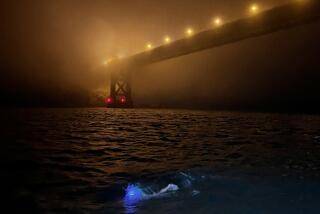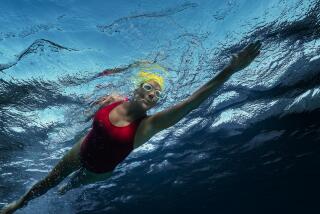Woman Poised for Chilly Swim to Cool Soviet Union
- Share via
A 30-year-old Los Alamitos woman is going ahead with preparations to swim the Bering Strait to the Soviet Union this week even as she waits for last-minute official permission from the Soviets to land on their Big Diomede Island.
Lynne Cox, a 16-year veteran of marathon swims throughout the world, has been training for a week at Nome on the southern side of Alaska’s Seward Peninsula. Cox, who wants to gather information on the effect of cold water on the human body, complained that the water was too warm at 56 degrees--”tropical,” she said, “like Southern California”--and getting warmer.
One day she rode the weekly mail helicopter from the village of Wales on the western tip of the peninsula out to the U. S.-owned Little Diomede Island 26 miles offshore to check conditions “and talk to the Eskimos,” she said by phone from Nome.
She described accommodations on Little Diomede, where she’ll start the swim, as “very, very primitive. You are probably in one of the most remote places in the world.”
The rocky little island is inhabited by 158 Eskimos, who fish and hunt walrus. They are watched by a Soviet observation post on top of a mountain on Big Diomede, 2.7 miles away. There is one telephone that isn’t always working.
The air temperature was 36 degrees Fahrenheit. The water was 40, slightly warmer than Cox expected. In 1976 Cox spent an hour in 42-degree water while swimming the 4.5-mile Straits of Magellan, near the tip of South America, without a wet suit.
Saltwater freezes at 28 degrees, she said, by way of general background.
Cox has been challenging herself in various bodies of water throughout the world since she was a teen-ager. Her adventures include a 1973 swim across the English Channel, an ill-fated swim down the Nile memorable for “mud, slime, dead rats and raw sewage,” a seven-mile (“piece of cake”) swim off Japan, and encounters with “jellyfish as big as trash-can lids” on a 12-mile swim from Denmark to Sweden.
Although the channel between Little Diomede and Big Diomede is only 2.7 miles wide, Cox estimated she might have to swim six or seven miles overall because of strong tides and a 3-knot current.
“If we go all the way across I’d like to make it in 2 1/2 hours,” she said.
The day she was on Little Diomede the wind blew up to 40 knots, making the channel dangerous even for boats.
“Most of the time I’d swim along the shore to test the water, but I didn’t feel comfortable there,” she said. “The natives said it was real calm the day before.
“The key to this thing will be the weather, not only doing the swim but getting out to the island.”
Medical personnel who will monitor her swim to study the effects of hypothermia were due to arrive in Nome this weekend. The party is scheduled to go to Little Diomede on Wednesday. Cox will begin the swim as soon as weather conditions permit, perhaps as early as Thursday. Her group expects to take most of their own food. They will camp in sleeping bags on the floor of Little Diomede’s schoolhouse.
Cox was optimistic that the Soviets would grant permission to cross the International Date Line into their territorial waters and land on Big Diomede, which has a small Soviet army installation.
“I’ll go as far as the Soviets will let us go, and I hope that they’ll work with us on it,” she said. “If it means just going as far as the International Date Line and touching tomorrow, we’ll get the data from (that swim) and share it with the researchers. If (the Soviets) open it up, we’ll land on their shore.
“I don’t think anybody’s swum in water that’s this cold, anyway. So whatever we get out of it, we’ll get more than we’ve ever had before. I wouldn’t come up here to do it without gaining something.”
‘Stressed Out’
Told that she sounded tired on the phone, Cox said she was “stressed out.”
Maria O’Sullivan, a friend of Cox who is with her as a volunteer assistant, said: “She’s very tired. A lot of this is falling on her. There’s no one else up here to take care of the essentials.”
Cox has been trying to make most of the logistical arrangements for transportation, escort boats and equipment. Her project director, Joe Coplan of U.S. Swimming Inc., the national governing body for competitive swimming, has been in New York working on the political ramifications.
The project originally was budgeted at $160,000, considerably more than any of Cox’s previous efforts, which primarily were funded by her earnings as a free-lance writer and by her father, a radiologist. But funding has fallen far short of $160,000, although Cox has drawn some limited commercial sponsorships.
The other concern now is the Soviet Union. Cox said: “What we’ve basically said to the Soviets is, ‘Can you meet us at the International Date Line and help us get over to your shore, because you know the currents far better than we would? We’d like to work with you on that, and we’d like to have a couple of your researchers--physiologists or whatever--there to meet us.’
“Telexes have gone out to all the sports people, medical people and political people that have a say, so they definitely know about it. We haven’t had any response officially yet, other than their requesting the passport numbers and saying, ‘What would you like from us?’ ”
That response came to Coplan’s office July 23 in a Telex from the Soviet Union’s State Committee for Physical Culture and Sports, also known simply as the “Sports Committee.”
Because the Soviets wanted to know the time and route of the swim, the identities and passport numbers of the support group that would land on Big Diomede “for visas arrangement” and a “detailed list of services (to be) provided by the Soviet side,” Cox is confident that official approval is a matter of course.
“Bob Walsh, who negotiates these things for the Goodwill Games, said ‘it could come 48 hours before you take off, or it could come when you’re in the water,’ ” Cox said.
Expects Approval
Walsh, who has a Seattle public relations agency, is chief executive officer for the U.S.-Soviet Goodwill Games scheduled at Seattle in 1990 and has handled several cultural exchanges between the countries. He said the Soviets commonly approve such projects only at the last minute and usually don’t grant visas “until the day before you’re going to depart.”
On one of his frequent trips to the Soviet Union, Walsh presented Cox’s case to Marat Gramov, minister of the Sports Committee, and other Soviet leaders two week ago.
“It was my impression that something had broken down somewhere along the line and they didn’t know about it,” Walsh said. “But they all told me they would do their best to see that it would happen, even though they thought it was rather late.”
Walsh said he received a Telex Thursday saying: “Your proposal is being reconsidered, and we will advise you of our decision later.”
Walsh added: “The people I’ve talked to are the people who should be able to make it happen. The only thing that might stop it is if there might be a security problem (on Big Diomede).”
Meanwhile, Coplan gave the Soviets this list of things Cox and her party would like to have on the other side:
- Warming facilities, including a hot bath.
- General medical backup and resuscitation equipment.
- Escort vessel at the International Date Line to meet the party and escort it to Big Diomede.
- Experts on tides and currents in the area to provide input before the attempt.
- Warm jackets, hot coffee and chocolate.
- A Russian scarf, or babushka , for Cox to wear for photos after the swim as a gesture of good will.
Jacques Cousteau now has an expedition boat in Alaska. Cox said she had hoped earlier that the French oceanographer would assist in her attempt, but that now seems unlikely.
“They really would like to be involved in this project, but they can’t go unless they get clearance (from the Soviets),” Cox said. “Cousteau’s expedition hasn’t gotten clearance yet, so they’re waiting in Dutch Harbor” in the Aleutian Islands.
“We’re not waiting on them. We’re going to be using the umiak skin boats and maybe small metal launches to go along on the swim. By coincidence, the Coast Guard is going to be up in this area, so we’ve asked them to be on our side by Little Diomede, in case we need backup support.”
The delay in approval has been frustrating for Cox.
“It’s just part of it,” she said. “In Chile we had to get permission to do the Straits of Magellan, but it took a day.”
More to Read
Sign up for Essential California
The most important California stories and recommendations in your inbox every morning.
You may occasionally receive promotional content from the Los Angeles Times.













